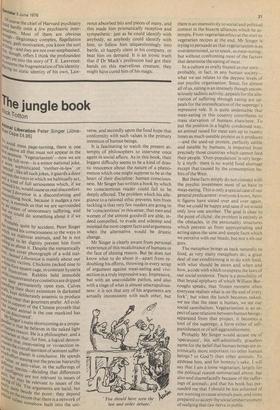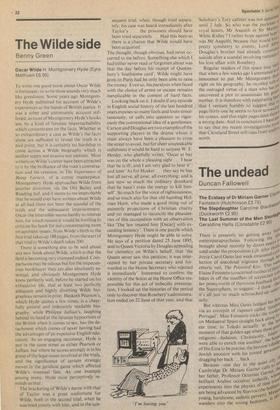he
ck T jungle book
otton
tha,,–;!1 Liberation Peter Singer (JonaTo w avoid mass page-turning, there is the a."'e full stop—is a minor national joke, 4sri:st i 411 above all that must not appear n " 'al)e £4.95) rsensiltenee. 'Vegetarianism'—now we are 'tee sophisticated 'mother-in-law' or be t°tal'; like all such jokes, it guards a door 4etriWeen the ways in which we habitualbc.awc t, e aih," 4 kind of full seriousness which, weditto, would cause us real discomfort. (4217/ Liberation is a discomforting and rie'-onlfit ing book, because it nudges a raw byrve: it reminds us that we are surrounded thaatil ocean of unnecessary suffering, and we we wishZie. could do something about it if Prou , ( ably quite by accident, Peter Singer ),"eoeY d his consciousness to the ways in we l animals, Drepa ma treat arum , and he is not vu to let dignity prevent him from irrei"8 us about it. Despite the romantically lie , evant cover photograph of a wild stai_ le: "'Nina' Liberation is mainly about our
thre)(°tic victims. Chickens packed nine to
arid ere-f°0t square cage, inconstant hysteria whila'rtistration. Rabbits held immobile into' corteentrated eye cosmetics are dripped sPea,1;ileir Permanently open eyes. Calves i staii-;98 their short existences in darkened the ,tePt deliberately anaemic to produce eace",te 'heat that gourmets prefer. All evi 'the will suPport of the Chinese proverb that nOt ...SeSt animal is the one mankind has
xli'ret discovered'.
Rand,..8,i4ger's main shortcoming as a propaOf hi,' iS that he believes in the naked light utie,ao reason. He is a philosopher, and a strairlan at that ; for him, a logical demo.nerease0,11,Lthat Meat-eating or vivisection l ining on–:Lue overall quotient of sentient suffer ;,,,`"is Planet is conclusive. He spends Valert teasing out the precise hierarchy differene' or anti-value, in the sufferings of telLsTecies—deciding that differences vain, .6.hce are not relevant to issues of Fe
'akin. May be relevant to issues of the
of life. The arguments are lucid, but firstlCYy " q°ite beside the point : they depend ethi the aSio th t there is a network of es sommehoaw built into the al Valti • uni
e verse, and secondly upon the fond hope that conformity with such values is the primary intention of human beings.
It is fascinating to watch the present attempts of philosophers to intervene once again in social affairs. As in this book, their biggest difficulty seems to be a kind of drastic innocence about the nature of a phenomenon which one might suppose to be at the heart of their discipline: human consciousness. Mr Singer has written a book by which no conscientious reader could fail to be deeply affected. The problem which his allegiance to a rational ethic prevents him from tackling is that very few readers are going to be 'conscientious' in this sense; that men and women of the utmost goodwill are able, indeed compelled, to evade and sidestep and misread the most cogent facts and arguments when the alternative would be drastic change.
Mr Singer is clearly aware from personal experience of this recalcitrance of humans in the face of shining reason. But he does not know what to do about it—apart from redoubling his efforts, throwing in every scrap of argument against meat-eating and vivisection in a truly impressive way. Impressive, but with an unavoidable pathos, and also with a tinge of what is almost unscrupulousness: it is not that any of his arguments are actually inconsistent with each other, but there is an insensitivity to social and political context in the bizarre alliances -which he at
tempts. From vegetarian ethics at the start to vegetarian recipes at the end, Mr Singer is trying to persuade us that vegetarianism is as overdetermined, so to speak, as meat-eating; but without confronting most of the factors that determine the eating of meat.
In a culture as orally fixated as our own — probably, in fact, in any human society—
what we eat relates to the deepest levels of our psychic organisation. Since, for almost all of us, eating is an intensely though uncon sciously sadistic activity, appeals for the alle viation of suffering through eating are appeals for the intensification of the superego's repressive role. It is quite undeniable that meat-eating in this country contributes to mass starvation of humans elsewhere. •To put the position in a highly condensed way, an animal raised fOr meat eats up to twenty times as much useable protein as it produces —and the used-up protein, perfectly edible and eatable by humans, is imported from precisely those countries which cannot feed their people. 'Over-population' is very largely a myth : there is no world food shortage except that caused by the consumption habits of the West.
But these facts simply do not connect with the psychic investment most of us have in meat-eating. This is only a-special case of our general predicament : everyone knows, heroic figures have stated over and over again, that we could be happy and sane if we would only love one another. The goal is clear to the point of cliché; the problem is entirely in the obstacles, in the personality structures which prevent us from appropriating and acting upon the sane and simple facts which we perceive with our heads; but not v. ith our guts.
The metaphor brings us back naturally to food, as very many metaphors do; a great deal of our conditioning is to do with food, with what should be eaten and when and how, a code with which to express the laws of our social existence. There is a possibility of that brutal epiphany of which William Burroughs speaks, that 'frozen moment when everyone realises what is on the end of every fork' ; but when the lunch becomes naked, we see that the meat is human, we see our social cannibalism. Vegetarianism is an aspect of sane relations between human beings ; separated from that project, it becomes a tool of the superego, a form either of selfpunishment or of self-aggrandisement.
Probably Mr Singer would accuse me of' 'speciesism', his self-admittedly graceless name for the belief that human beings are in trinsically more important (to other human beings? to God ?) than other animals. To
appease him, and for honesty's sake, I will
say that I am a loose vegetarian, largely for the political reason summarised above, but also and shamefacedly because of the suffer ings of animals; and that his book has persuaded me that I should be less ashamed of not wanting to cause animals pain, and more prepared to accept the social embarrassment of nudging that raw nerve in public. sequent trial, when, though tried separately, his case was heard immediately after
Taylor's . . . the prisoners should have been tried separately. . . Had this been so there is a .chance that Wilde would have been acquitted.
The thought, though obvious, had never Occurred to me before. Something else which I
had either never read or forgotten about was that the day before his receipt of Queensbury's 'loathsome card', Wilde might have gone to Paris had he only been able to raise the money. Even so, his paralysis when faced with the choice of arrest or escape remains inexplicable in the context of hard facts.
Looking back on it, I doubt if any episode in English social history of the last hundred years exposes so many fools and louts simultaneously, or calls into question so rigorously the conventional idea of a gentleman. Carson and' Douglas are two examples of the supporting players in the drama whom it must always have been a pleasure to cross the street to avoid, but for sheer unspeakable oafishness it would be hard to surpass W. E. Henlpy, who gleefully writes, 'Oscar at bay was on the whole a pleasing sight . . . I hear that he is ill ; and I am very glad to hear it': and later 'As for Hosker. . . . they say he has lost all nerve, all pose, all everything; and is just now so much the ordinary drunkard that he hasn't even the energy to kill himself'. So much for the voice of righteousness, and so much also for that old humbug Holman Hunt, who made a good thing out of painterly projections of Christian charity and yet managed to reconcile the pleasantries of this occupation with an observation like 'The law treated him [Oscar] with exceeding leniency'. There is one puz7le which Montgomery Hyde might be able to solve. He says of a petition dated 25 June 1895, sent to Queen Victoria by Douglas appealing for clemency on Wilde's behalf, that 'the Queen never saw this petition; it was intercepted by her private secretary and forwarded to the Home Secretary who rejected it immediately'. Interested to confirm the identity of the Solon at the Home Office responsible for this act of imbecilic presumption, I looked up the histories of the period only to discover that Rosebery's administration ended on 22 June of that year, and that Salisbury's Tory cabinet was not aPPointecl until 2 July. So who was the purloiner royal letters, Mr Asquith or Sir Matt116‘il White Ridley ? I rather hope against hoPc, was Mr Asquith, because that would lenyj pretty symffietry to events; Lord Douglas's brother had already cominil suicide after a scandal involving rumour' his love affair with Rosebery.
Regular readers of this space may r") that when a few weeks ago I attempted in3di innocence to put Mr Montgomery HY II right on his geography, he recoiled with at the outraged virtue of a than who hasjuds, uncovered a plot to assassinate his gri mother. It is therefore with palpitating he''n that I venture humbly to suggest that,°,0 page thirty-one he seems to have screwn his syntax, and that eight pages later the ISO a wrong date. And in conclusion I have °,1 to say that my recent investigations re70 that Cleveland Street still runs from south north.



































 Previous page
Previous page